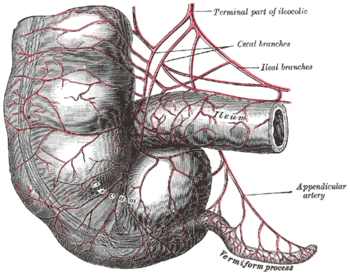Appendix has purpose: Scientists
Sunday, October 7, 2007

Researchers at Duke University in Durham, North Carolina, United States believe that they have found the purpose of the vermiform appendix, long thought to be useless. The theory, published in the Journal of Theoretical Biology this week, is that the appendix creates and protects helpful microorganisms for a person's digestive system.
For years, scientists believed that the appendix served no purpose, and wondered why it was even present in the human body. Surgeons removed them regularly, and it seemed to have no ill effects on the health of patients.
In addition, when infected the appendix became harmful and even deadly. Inflammation occurs quickly and can cause death if the infected organ is not removed in time. According to the Centers for Disease Control and Prevention (CDC), in 2005 321,000 Americans were stricken with appendicitis. On average, 300 to 400 Americans die of appendicitis each year.
The new theory, proposed by surgeons and immunologists at the Duke University School of Medicine, says that people throughout most of human history lived in small, spread out groups. As a result, their contact with other people was far more limited than it is today in modern industrialized societies. Today, if a person's digestive tract lacks helpful bacteria, they can regain the needed germs from contact with large numbers of other people. In times when populations were less dense, and cholera epidemics purged large numbers of people's useful digestive bacteria, the appendix was able to restore the digestive system's supply of helpful germs.
"[The appendix] acts as a good safe house for bacteria," said Duke surgery professor Bill Parker, a co-author in the study. He said the appendix's location--below the one-way passage of food and germs through the large intestine in a digestive cul-de-sac--helps validate the theory. The worm-shaped appendage also acts to manufacture these helpful germs, Parker said.
Parker added that in less developed societies with lower population densities, the appendix may still be useful and rates of appendicitis are lower. However, regardless of the appendix's apparent function, Parker confirmed that those suffering from appendicitis should still have it removed.
Scientists not affiliated with the study have come out in favor of the theory. Brandeis University biochemistry professor Douglas Theobald said the idea was the most likely purpose of the appendix. "It makes evolutionary sense."
Sources
- Seth Borenstein. "Scientists: Appendix Protects Good Germs" — The Associated Press, October 6, 2007
- Patrick J. Lyons. "Notes on the News: Strange Byways" — New York Times, October 5, 2007
- Associated Press. "Purpose of appendix believed found" — CNN, October 5, 2007